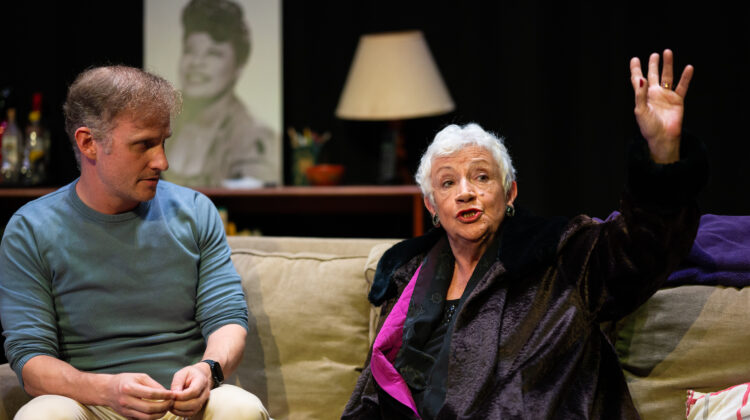
The relationship between a stubborn, conservative mother and her gay son is bound to be complicated. Add the AIDS pandemic that decimated the population of gay males in the 1980s and a previously unacknowledged partner who remarries and has a son, and top it off with a surprise visit to the latter’s New York apartment by the former ‘mother-in-law’.
The result is Mothers and Sons, Terrence McNally’s poignant script that was heart-rendingly brought to life at Theatre Next Door under the direction of Tyrone Grima.
Polly March shines bright as Katherine, whose son Andre succumbed to AIDS some 20 years previously. She is on an unannounced visit to Cal, his now remarried partner. Early on, she reveals that she had never accepted this romantic relationship during her son’s lifetime, referring to Cal as ‘Andre’s friend’. March’s performance inspires many contradictory emotions in the audience as the actor masterfully projects contempt and coldness that alternate with vulnerability and the intense love of a mother for her dead son. We can’t help but dislike her, and yet we feel deeply for her loss, which she clearly is yet to come to terms with.
March asserts herself for the powerhouse that she is right from the moment the play opens. She looks on in silence as a visibly nervous Cal (Edward Caruana Galizia) waffles on about inconsequential matters like the view. She doesn’t need to say a word, the range of expressions on her face replacing the need for dialogue. She effortlessly dominates the rest of the play, flawlessly portraying the various transitions of her complex character as she struggles between her innate homophobia and the despair she feels at the loss of her son to what was then a largely misunderstood sickness.
Mothers & Sons: a late redemption
Caruana Galizia’s Cal is all-too-human. For many of us who didn’t live through the AIDS disaster that was handled so poorly by society, it may be difficult to fully appreciate the sadness of this chapter in history. Caruana Galizia renders it real, his impassioned words translating it into a tangible tragedy that decimated lives, relationships and families.
David Chircop as Wil, the new husband, injects a touch of humour into the script. I would have liked to see the sarcastic aspect that’s integral to the character kept up throughout, as the script intends Wil to be the foil to the more placatory Cal. Chircop’s portrayal veers between the sarcastic and the empathic, but remains highly effective within the humane nature of the narrative.
The play included the debut of Ben Zammit Marmarà as the couple’s very young son. An adorable performance, and I’ll be looking forward to see young Ben treading the boards again.
Tyron Grima’s direction is sensitive and solid. I particularly admire the way Grima invariably creates immersive tableaux, even using the sense of smell as a very potent device. He had already used this technique to great effect in Għanqbut f’Moħħha. Mothers & Sons could have benefitted from slightly tighter pacing, especially in the scenes of conflict, but this is one solid production that shines a spotlight on a issue that many of us may find difficult to relate to.
Grima succeeds in bringing out the humanity of this sad chapter in history. His production is not a story of statistics, as only too many news reports were, but of lives cut short. Much like Matthew Warchus in the film Pride, Mothers & Sons removes the AIDS tragedy from the realm of the hypothetical, sweeping the audience into a tide of human pathos until finally, heartbreakingly late, we find redemption together with Katherine.
For more Malta culture reads check out this review of Her Say, Not Hearsay and The Beauty Queen of Leenane.
Affiliate/Advertising Disclaimer: How I Carry Out Reviews
I received no payment for this review and I used press review tickets The opinions expressed here are purely my own and the theatre company had no input/control over what I wrote. No affiliate links are included in this review.To learn more about my policies and my reviewing process, visit my Affiliate/Advertising disclosure page.
